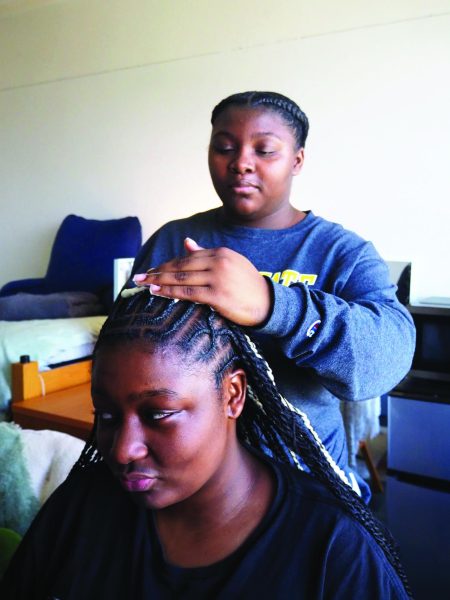Wayne State Student Reflects on their Heritage for Native American Heritage Month
November 16, 2022
In 1990, President George H. W. Bush designated November as “National American Indian Heritage Month” also known as “Native American Heritage Month.”
November is now seen as a time to honor those of Native American heritage and learn more about that tribes that occupied this land first. The region we live in today was once occupied by various Native American tribes, and many people of Native American descent continue to live on the same land to this day.
Tyressa McManigal is a Wayne State College student from the UMÓⁿHOⁿ (Omaha) Tribe of Nebraska.
“There are 10 clans, and I am a member of the Buffalo clan,” McManigal said. “My tribe came from the Ohio river basins and migrated here to Nebraska.”
The people of the Omaha Tribe originally lived on the river near present day Cincinnati, Ohio, and migrated to occupy the land of current day Nebraska, Iowa, and South Dakota.
In the 1700’s, the Omaha people occupied approximately 35,600,000 acres from Yankton, South Dakota to Rulo, Nebraska, and extended approximately 150 miles to the west. The tribe had known villages set up in Homer and Bellevue. They had many other settlements along the Missouri river but are not as well documented as those in Homer and Bellevue.
“My people were earth lodge people during the colder months and used teepees during the warmer months,” McManigal said.
In 1855, the people of the Omaha tribe signed a treaty with the United States Government, giving up hunting grounds in exchange for a reservation after their numbers had continued to decrease after settlers had moved into the area. Ten years later, in 1865, the original reservation they were given was cut in half by the American Government, and half of the land was given to the people of the Winnebago tribe. As of 2020, there was approximately 4,500 people living on the Omaha Reservation. McManigal is one of the many people of Native American descent living on the reservation today.
The tribal seat of government is in Macy, and the reservation occupies land in Thurston, Cuming and Burt counties in Nebraska, and Monona County of Iowa.
“Being a Native American student overall hasn’t affected my experience on
Campus,” McManigal said. “It would be messed up to think that in this day and age that my heritage or cultural differences would have affected my experience here on campus in any negative way.”
At this time, WSC does not have any clubs or groups specifically meant for students with Native American heritage.
“We are a humbled tribe, and we keep our practices and beliefs pretty private and
Sacred,” McManigal said. “We do believe in fasting. Fasting is a practice where we go out into the wilderness. We will have our traditional possessions such as a pipe, tobacco ties, four colored flags, filet knives etc. The people who are helping with the fasting go and set up an altar for the participant(s). They will sit out in the altar for four days and four nights. The point of this practice is to cleanse and clear the mind of negative energy and to get an understanding or direction of life.”
Native American Heritage Month is an important time of year for Native Americans, and is a time when they receive the honor and recognition they deserve for being the first to occupy the land we live on today.








